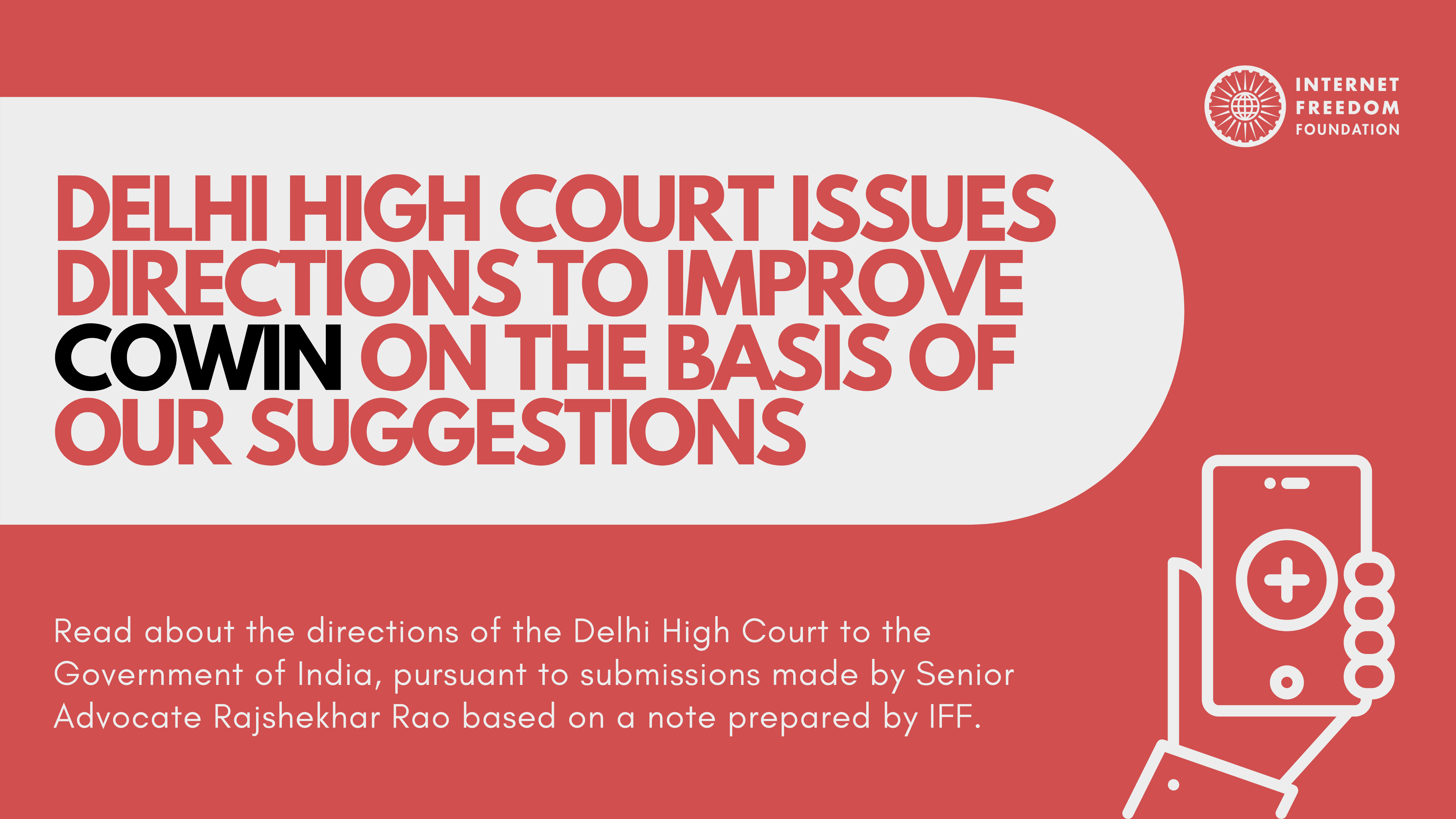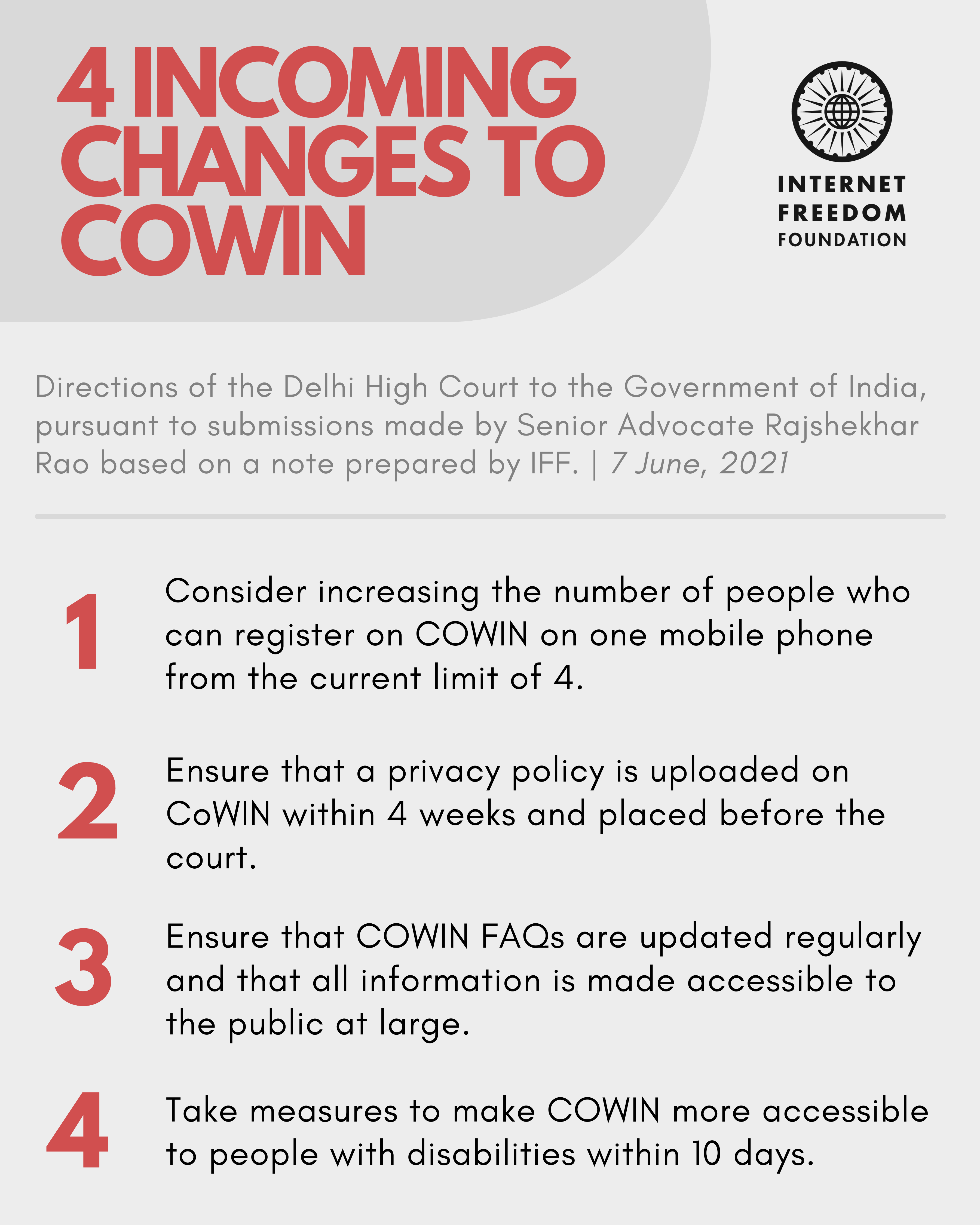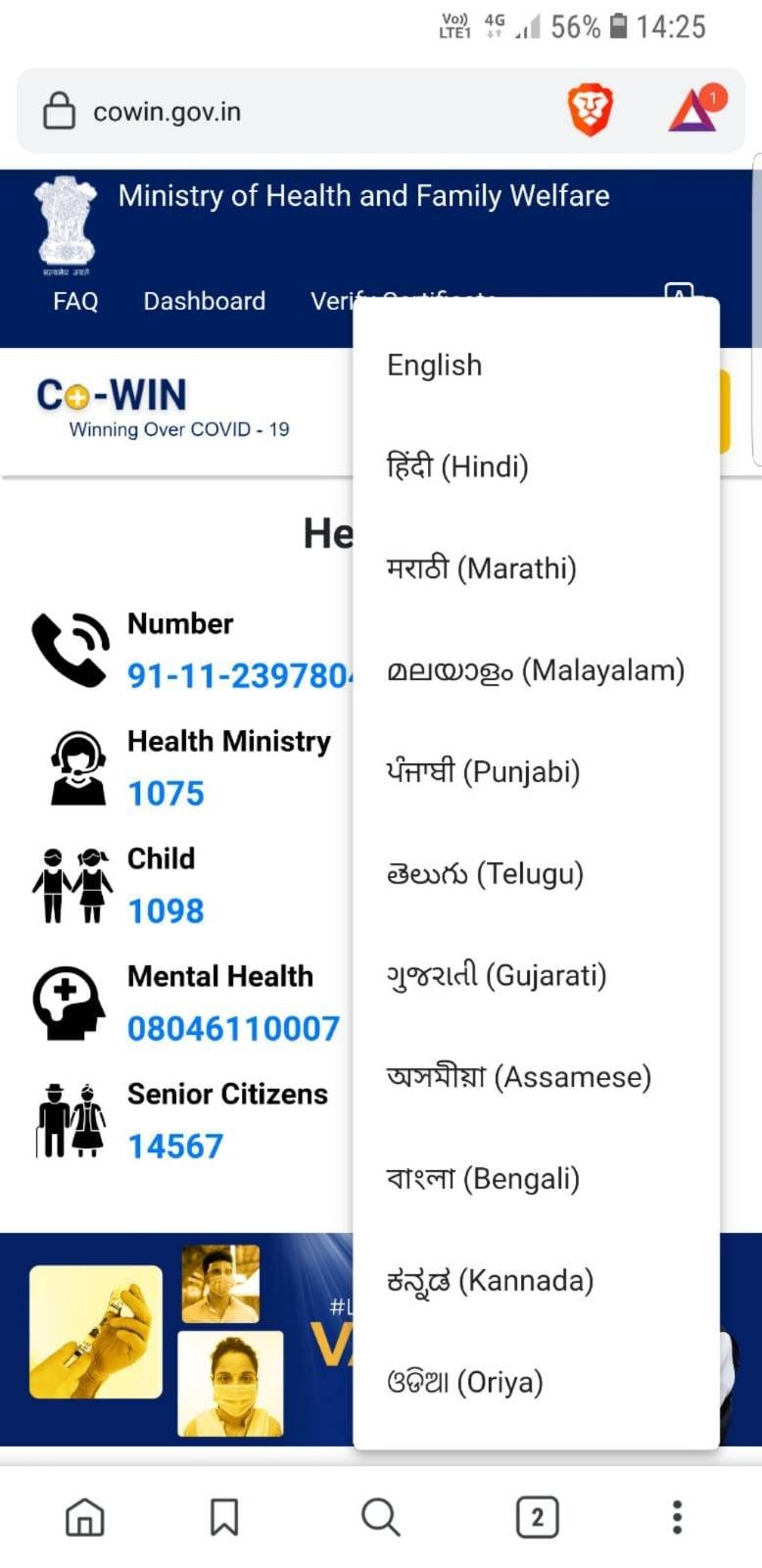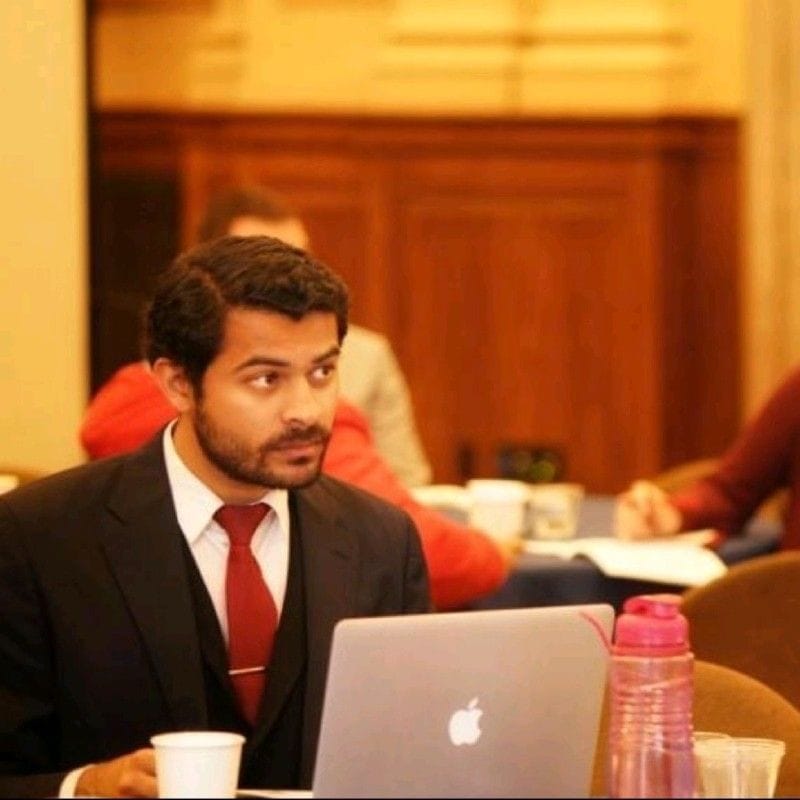
tl;dr
In a massive victory to overcome the digital divide in vaccination a division bench of the Delhi High Court issued a series of directions offered by the Amicus, Senior Advocate Rajshekhar Rao on a note prepared by IFF. Hopefully it will soon lead to massive improvements including alternate modes or registration, co-win becoming more accessible, multilingual and having a privacy policy.
Background
On 23 April, 2021, the Government of India announced the “largest vaccination drive,” in Phase III of the National Vaccination Strategy under the “Liberalised Pricing and Accelerated National COVID-19 Vaccination Strategy”. The Ministry of Health and Family Welfare subsequently sent a letter to State Secretaries. These two documents lay out the conditions for Phase III of the vaccination, in which persons between the ages of 18-45 are eligible for the vaccine. We were concerned that those in the 18-45 age group can only register for the vaccine online, through the CoWIN platform, without an option to walk-in and register. Mandating online self-registration for vaccination without a walk-in facility further entrenches inequities in access to the vaccine. Only those with access to the internet and who can operate an app-based system will be able to register themselves, or will register themselves ahead of others, leaving the poor and vulnerable behind, creating an enormous divide in access to the vaccine.
In the wake of the second wave of the Covid-19 pandemic, a division bench of the Delhi High Court comprising Justice Vipin Sanghi and Justice Jasmeet Singh began hearing Manisha Chauhan v. Government of NCT of Delhi and other related matters relating to various Covid-19 relief measures, including hospital beds, oxygen supply, medicine supply, ambulance availability, and the CoWIN platform. The Court appointed Mr. Rajshekhar Rao, Sr. Advocate as its amicus curiae. An amicus curiae, or friend of the court, is not a party to the litigation, but is appointed by the Court to assist it in matters where the Court requires such assistance.
We drafted a note highlighting CoWIN’s issues
Our legal team, led by Advocate Vrinda Bhandari and assisted by Tanmay Singh, prepared a briefing note on May 11, 2021 for Mr. Rajshekhar Rao, Sr. Advocate. The note highlighted the major issues with the CoWIN platform, in particular that only those with (a) access to a smartphone device or a laptop, (b) access to the internet, and (c) with digital literacy, i.e. with the capability of operating an app-based system or using a website will be able to register themselves, leaving the poor and vulnerable behind, creating an enormous digital divide in access to the vaccine. This is a problem, since currently, around 25% of India’s population does not have access to a smartphone. Since there is no offline option to register for the vaccine for those who are unable to secure an appointment through the CoWIN website/app, this completely excludes those who may be homeless and other vulnerable populations.
The CoWin website and mobile application are only available in English, and no other Indian language. This will disproportionately advantage the privileged, English-speaking urban population at the cost of the vast majority of rural India. We also pointed out that mandating that all vaccinations are routed through the government’s CoWIN platform, without clarity on how the data will be used, amounts to enforcing a “data tax” by the Government of India.
A second note from us offered easy to implement solutions for some of the biggest problems with CoWIN
On May 18, 2021, we submitted a subsequent note to Mr. Rao offering suggestions for the improvement of four most pressing concerns with the CoWIN platform, but that are also the easiest to implement. Our goal was to dramatically improve the functionality of CoWIN in the easiest manner possible. We offered four suggestions to this end:
- Increase the number of people who can register from the current limit of 4 - This seriously limits the number of people that can be helped by one person with access to all of the requirements.
- Publish a data privacy policy - Users presently must provide personally identifiable information and personal health data to the CoWIN portal, without there being a data privacy policy in place.
- Publish a separate webpage containing the FAQs for CoWIN - Presently, the FAQ page on CoWIN does not open online, and requires the user to download the FAQs as a separate file on word. This reduces the accessibility. It disadvantages users who do not have access to reliable high-speed internet services, and also users who may not have achieved complete digital literacy, or those who simply may not wish to spend the additional time to download a document to read it.
- Alternative forms of Captcha ought to be provided using output modes for different types of sensory perception to accommodate different disabilities - CAPTCHA renders the website inaccessible to persons with visual impairment and is in contravention of the accessibility requirements of Sections 12(4) read with 42(1) of the Rights of Persons with Disabilities Act, 2016, Rule 15 of the Rights of Persons with Disabilities Rules, 2017, Clause 6.6.3 of the Guidelines for Indian Government Websites and Apps, as well as TRAI Recommendations.
The Delhi High Court accepted all our suggestions

Mr. Rao placed both briefing notes before the Delhi High Court. On June 2, 2021 the Court passed a detailed order in respect of each of our four suggestions. With respect to the first suggestion, the Government’s counter argument made before the Court was that the number has been limited to only 4 to prevent hoarding of vaccination bookings by middlemen. This approach and reasoning did not appeal to the Court, as observed in the Order, and the Court directed the government “to keep in view the position as it exists on the ground, and there may be need for the respondents to increase the number of the registrations per mobile phone to cover large sections of the population” since “the primary object of the State should be to ensure vaccination of the maximum numbers of the population in the shortest period of time.”
Our second suggestion relating to the privacy policy was also accepted by the Court which observed that such a policy has indeed not been placed before the Court or even disclosed on the portal. The Court ordered the central government counsel to ensure that a privacy policy is uploaded on the CoWIN portal within 4 weeks, and placed before the Court.
The next suggestion dealt by the Court was the concern relating to exclusions caused by the captcha. The Court held that “the endeavour of the respondents should be to make the said mobile application as user friendly as possible, so that even the not so literate people are able to use the same”, and ordered the government to examine the alternatives, such as voice enabled captchas, or the adoption of OTP Technology, and take appropriate measures within 10 days.
The last suggestion related to the FAQ page, which had been updated in the time between our drafting of the note, and the Court placing reliance on it. However, it was not completely updated. The Court ordered The Union of India to ensure that the FAQs on the COWIN application are updated regularly, and all relevant information is provided to the people at large who use the application.
We are also happy to note that changes to the COWIN platform are already underway to promote accessibility of the portal and thereby the vaccines to larger sections of the population. Recently, we observed that the COWIN platform was available in languages other than English, as suggested in our May 11, 2021 briefing note.

We believe that incremental change is possible through sustained advocacy and collaboration. Our goal in assisting Mr. Rao was to offer solutions that would be easiest to implement, but would simultaneously cause the biggest impact. We are grateful to Mr. Rao for placing our suggestions before the Delhi High Court. The order has reaffirmed our resolve to continue to find solutions to immediate short-term concerns, while we use strategic litigation to tackle long-term problems as well.
Important documents
- Our note for Mr. Rajshekhar Rao offering easy-to-implement solutions to CoWIN problems (link)
- The Order of the Delhi High Court dated June 2, 2021 (link)
- Joint Statement dated May 11, 2021 ‘Ensure equitable access to COVID-19 vaccines and health care resources’ (link)

